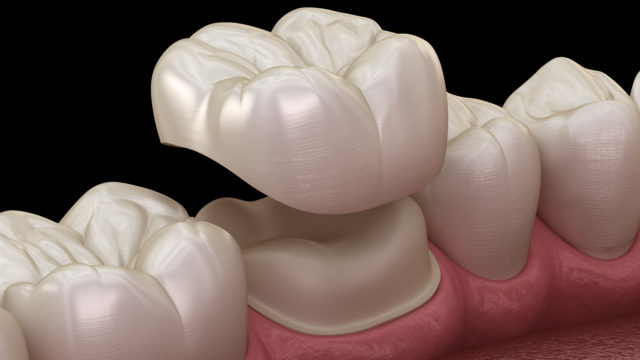Everything you need to know about dental crowns
Not just for royalty, dental crowns play an important part in keeping your smile looking great and protecting your teeth. There’s a lot to consider when getting a dental crown – the difference between same day crowns and crown onlays, materials and costs…
Let’s take a deeper look at this dental treatment…
What is a dental crown?
Think of a dental crown like you would a hat. These tooth-shaped caps are placed over the existing tooth to restore it to its former size, shape, strength and generally improve its appearance. A dentist will recommend dental crowns for a number of reasons including:
- Tooth decay or cavities weaken the tooth and leave it vulnerable to further damage
- Root canals essentially hollow out your tooth and leave it susceptible to cracks.
- Cracked or chipped teeth can cause sensitivity, pain, and the tooth may even break in half if left untreated.
- Cosmetic reasons, like discolored teeth, can be corrected.
Note that dental implants and bridges generally require the placement of a dental crown. For dental implants, the crown fits over the implant to restore your smile. When you get a bridge, crowns would fit on the teeth to either side of the missing one. They serve as anchors for the artificial tooth.
Types of dental crowns
There are different kinds of crowns to suit any situation.
- Made from metal or plastic, a temporary crown is made to only last a few weeks and is used to cover a tooth while you wait for a permanent crown to be ready.
- Permanent crowns, however, are made of studier material like gold, ceramic, stainless steel and even porcelain which will last years and they adhere to the underlying tooth to form a protective tooth cap.
- One-day crowns or same-day crowns can be crafted in the office and placed at that appointment.
What is a crown onlay or a ¾ crown?
As opposed to traditional crowns that cover the entire tooth, onlays and ¾ crowns cover less of the underlying tooth. A more conservative approach, this treatment is often used when you still have a solid tooth structure.
Common materials for dental crowns include:
Depending on the location and function of the tooth as well as the condition of your gum tissue, your dentist may select different materials for your crown.
- Metal crowns are durable and can be gold, nickel, chromium, or possibly palladium. They work especially well for molar crowns because the gold or silver tooth cap won’t be as obvious.
- Porcelain crowns match natural tooth color well and make excellent choices for people with metal allergies.
- Ceramic crowns also match well with your natural teeth and work well as front tooth crowns.
- Porcelain-fused-to-metal crowns give you the best of metal and porcelain in one. They can match your natural tooth better but hold up longer than all-porcelain crowns.
- All-resin crowns make the most affordable tooth cap, but they are not as durable as other options.
What problems can develop with a dental crown?
Even though a dental crown is often regarded as the last step in restoring a tooth, it doesn’t mean it doesn’t come with complications.
Dental decay
If you don’t practice good hygiene, after getting a crown, plaque can build up and though the crown won’t decay, your teeth still can. Prevention through brushing and flossing twice a day is better (and cheaper) than replacing the crown.
Teeth sensitivity
After placing your crown, you might experience some hot and cold sensitivity. This is because when your crown is placed, the enamel on the tooth is filed away, leaving exposed dentin. Your dentist may apply a solution to protect the dentin or recommend a toothpaste for sensitive teeth.
Chipped crowns
Crowns made of porcelain can sometimes chip, but small chips can easily be repaired. However, your dental crown will need to be replaced entirely if the chip is large or if there are many chips.
Loose crown
Sometimes, the cement that holds the crown on can wash out, which causes the crown to come loose, and bacteria can decay the underlying tooth. If your crown feels loose, contact your dentist’s office.
Allergic reaction
Though more rare, some people can experience an allergic reaction to the material used to create the crown – especially materials.
Crown falls out
Due to an improper fit or lack of cement, a dental crown can actually fall out. If this happens, you need to contact your dentist immediately. The dentist might still be able to re-cement your crown in place, otherwise a new crown will need to be made.
Dark line forms
If you have a porcelain-fused-to-metal crown, you may start to notice a dark line next to the gum line of your crowned tooth form. This is normal — this dark line is simply the metal of the crown showing through.
How to care for a dental crown?
Most, if not all, problems can be avoided by taking care of your teeth and your crown by:
- Brushing carefully at least twice per day.
- Flossing daily to keep your teeth and gums healthy.
- Avoiding hard foods and ice that could result in a cracked crown.
- Wearing a nightguard if you grind your teeth in your sleep.
Remember to be extra careful with temporary crowns because the adhesive isn’t as strong. Brush and floss gently to avoid popping it off.
Costs
Dental crown costs vary depending on the tooth and the material used. You can expect a tooth crown to cost between $1000 and $2000 on average. Porcelain crowns cost more than metal ones, and usually, a front tooth crown costs less than a molar crown.
If you’re worried about how to cover the crown costs, Jefferson Dental & Orthodontics can help. We offer a Dental Savings Plan andaffordable payment plans to make dental crowns more budget-friendly. Find the office nearest you to get started!




